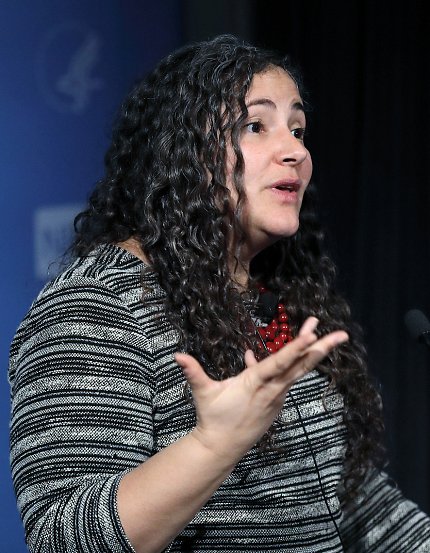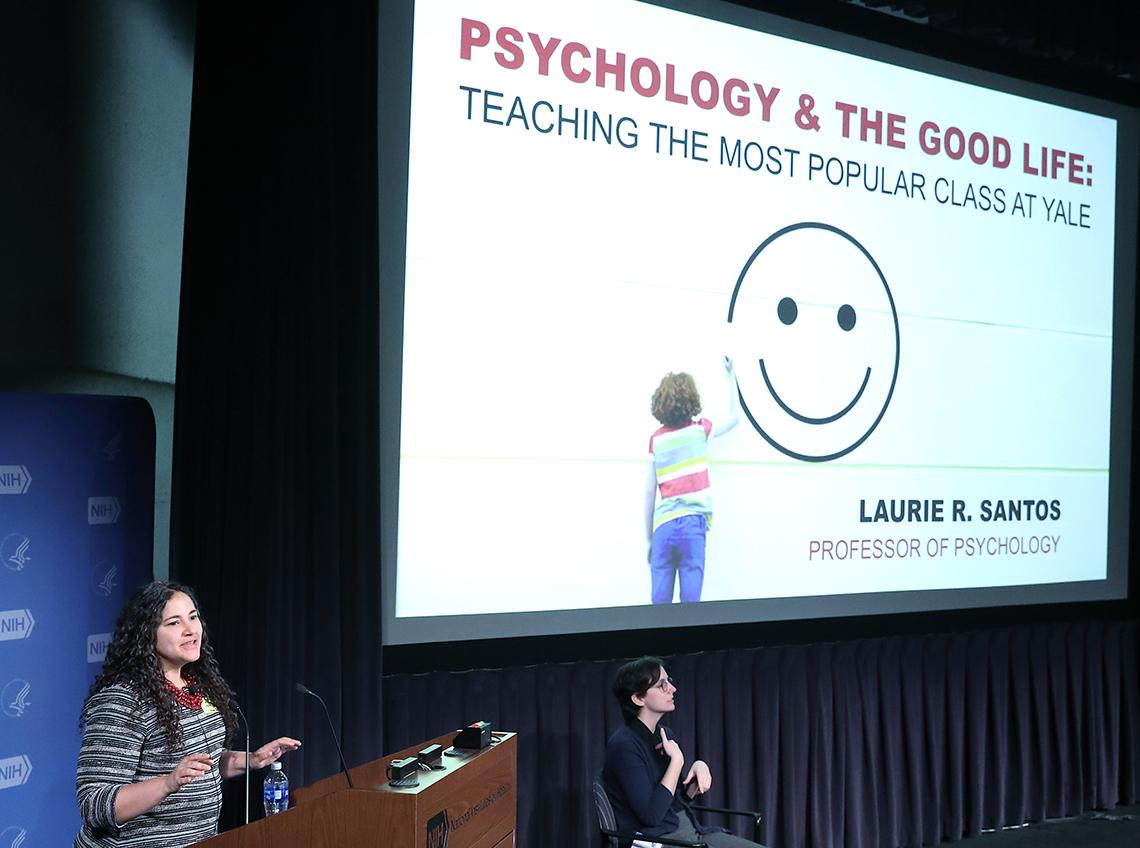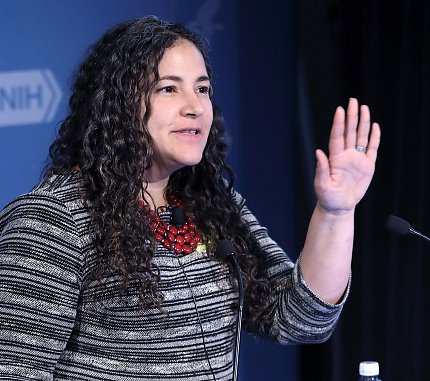Savor the Moment
Yale Professor Divulges Strategies for a Happy Life

Photo: Chia-Chi Charlie Chang
If you think happiness is genetic, you may be half right, or half wrong, depending on your outlook. While research shows that some genetic factors contribute to happiness, even if you’re a genetically predisposed grump, there’s plenty you can do to find and cultivate happiness, and perhaps spread a little joy to others too.
Two years ago, Dr. Laurie Santos, who has taught psychology at Yale for 17 years, began teaching a class on happiness—Psychology & the Good Life—that quickly became the university’s most popular class ever. She gave NIH’ers a crash course at a Feb. 6 Deputy Director for Management Seminar, speaking to an enthusiastic, packed crowd in Lipsett Amphitheater.
Santos recognized the need for such a class after becoming head of Yale’s Silliman College. Living among students, she began observing an alarming trend confirmed in national surveys: a growing number of college students report feeling depressed, anxious, lonely, overwhelmed, even hopeless, much of the time.
“We have a scientific approach to how we can solve this mental health crisis and, in particular, how we can promote well-being in the trenches for these students,” said Santos. “These aren’t viruses or test tubes…but it is a scientific approach.”
The science is based on social experiments in which researchers find very happy people to study.
“You can find them; they’re out there, even living in the D.C. metro area,” Santos said to laughter. Now, two decades worth of studies help validate the happiness strategies she teaches.
The demand for a happiness class should’ve come as no surprise to Santos, though enrollment exceeded all expectations. Nearly 800 students registered for the new class, and that number soon swelled to 1,200. The class got so large, it had to relocate first to the campus chapel, then to the concert hall.
“[Its popularity] shows that students don’t like this culture of feeling anxious and overwhelmed,” Santos said, “and they really wanted an evidence-based approach to do something about it and take different kinds of actions.”

Photo: Chia-Chi Charlie Chang
In the class, Santos teaches the science behind the good life with a twist on requirements, what she calls “rewirements”—practices that can rewire our habits such as savoring the moment, expressing gratitude and experiencing social connections. Her happiness-boosting tips are straightforward, though she admits they can also seem intimidating. The benefit comes from consistently putting them into practice, she said, a realization among her students that inspired the Twitter handle #hardestclassatYale.
Misconceptions about happiness
Before we can rewire our habits, said Santos, we need to retrain our brains, which often are lying to us about what really makes us happy.
Most people assume that more money would make them happier. When researchers ask what salary would make them content, regardless of earnings, respondents say they’d need more.
“You never get to the goal but, more insidiously, the goal gets further away as you get more money,” said Santos. “The more materialistic you get, the less happy you become.”
Another hindrance to happiness is what Santos calls “the G.I. Joe fallacy.” The 1980s action hero would say at the end of every cartoon episode, “Knowing is half the battle.” Knowledge is a start, said Santos, but knowing what we should do doesn’t necessarily translate into action.
We all have an opportunity to take charge of our happiness, since less than half of our well-being is inherent.
“A decent chunk of our happiness comes from the stuff we can control,” said Santos. We can change our attitudes, behaviors and mindsets but, as with most worthwhile things in life, it will take consistent effort.
Take action to be happy
Make time for social connections, urged Santos.
“Talking to the barista at the coffee shop, making an effort to connect more in real life with your [colleagues] and prioritizing time with family and friends can promote well-being,” she said. “Even introverts get exactly the same magnitude of positive effect when they actually talk to people.”

Photo: Chia-Chi Charlie Chang
Studies also show that giving is the gift that keeps on giving. Whether the deeds are big or small, helping others—volunteering your time, buying someone a gift or donating to charity—can increase your happiness.
Make time for gratitude, advised Santos, who asks her students to keep a gratitude journal. Jotting down a few things you’re grateful for daily can dramatically improve well-being as does expressing it to others. For homework, she assigns the gratitude visit. Write a letter of gratitude and deliver it in person. It’s a note the recipient will cherish and the act can boost your own happiness for months.
It’s time for your midterm exam. How does expressing gratitude improve well-being?
“If you tell someone you’re thankful for them, first, you have to have a social connection,” said Santos. “Second, you’re doing something nice for somebody else…and you’re feeling the gratitude inside when you’re expressing it.”
One insight won’t surprise most NIH’ers. Physically healthy practices such as regular exercise and enough sleep make us happier.
“I think we could solve a lot of the college students’ mental health crises on campuses if we just got our students to sleep [more],” said Santos.
Another happiness tip: Be in the present moment. “Notice what it feels like to be you, in your body, right now,” she said.
Researchers estimate people self-report mind-wandering about half the time, which means people often aren’t paying attention. Savor the moment, Santos said. Relish that treat; notice your emotions. Research shows that a few minutes of daily meditation can change the brain regions involved in mind-wandering.
And, be wealthy, said Santos, not necessarily in money, but in time. Happier people prioritize having a little more time, she said. In fact, when Santos once cancelled her class as an experiment, one student burst into joyful tears, saying it was her first free hour all semester.
If we decided to devote our time to pursuing only one happiness strategy, asked Dr. Alfred Johnson, NIH deputy director for management, which should we try? The one that’s best for you, said Santos, is the one you’re not already doing.
“Try the one you thought was going to be hardest,” she advised. “That’s going to be your biggest boost.”
